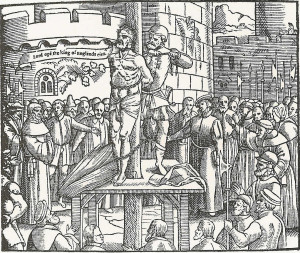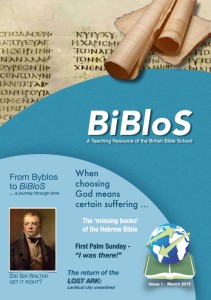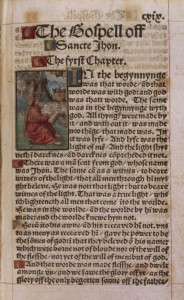Today we are in the privileged position of having available to us the Bible in our own English language. The fact that we can have a copy of the Bible in English is due in large measure to the work and vision of William Tyndale (c.1484-1536). Throughout the Middle Ages the Bible had become the exclusive property of the clergy. It was not accessible or available to ordinary people. It was written in Latin, a language no longer spoken or understood by the people, and since there were no printing presses all copies had to be produced by hand, hence they were rare and expensive. The development of the printing press in the mid 15th century made it possible for affordable Bibles to be produced in huge numbers.
Men like William Tyndale had a vision of the Bible being made available in the English language so that the ordinary people could read it for themselves. Tyndale’s work was opposed in England by church and political leaders and he had to flee to Europe to continue his work. In 1526 he produced his first edition of the New Testament in English. Copies were smuggled in to this country, and many were confiscated and burnt. Tyndale produced a second edition in 1535. By then he was in prison and had been condemned as a heretic. He was put to death near Brussels in 1536. He was tied to a stake, strangled and his body was then burned. Before he died, his final words are reported to have been, “Lord, open the king of England’s eyes.”
Although Tyndale did not live to see it, work on the translation of the Bible into English continued, and a change of attitude on the part of Henry VIII made the Bible more readily available to the people. The Authorised Version of 1611 is based largely on Tyndale’s translation of the New Testament.
Today the Bible is freely available in many different versions and formats and it remains a best seller. Yet despite the availability of the Bible, and the sacrifices made by men such as William Tyndale, it is a sad reflection that its contents are not as valued or appreciated as they might be. The Bible is unique; there is no other book like it. It is the written record of God’s communication with mankind. To help us appreciate the value of the Bible we shall consider the words of the apostle Paul written to Timothy in 2 Timothy 3:14-17.
But as for you, continue in what you have learned and have firmly believed, knowing from whom you learned it and how from childhood you have been acquainted with the sacred writings, which are able to make you wise for salvation through faith in Christ Jesus. All Scripture is breathed out by God and profitable for teaching, for reproof, for correction, and for training in righteousness, that the man of God may be complete, equipped for every good work.
(2 Timothy 3:14-17 ESV)
Continue in what you have learned
Paul encourages Timothy to “continue in what you have learned and have firmly believed.” Timothy had been taught the word of God, and he is encouraged to remain or continue in those things he had learned. Paul wrote at a time when false teachings were beginning to threaten the church, and so he wanted to ensure that Timothy would hold on to those core truths he had been taught. Paul tells Timothy that he is to continue in those things he has learned and “firmly believed”. Timothy firmly believed the things he had been taught, convinced of their truth.

William Tyndale, before being strangled and burned at the stake, cries out, “Lord, open the King of England’s eyes”
Timothy is exhorted to continue in the things he has learned because he knows from whom he learned them. Paul himself had been Timothy’s teacher of the things he firmly believed (2 Timothy 1:13; 2:2; 3:10). Timothy knew that Paul had been appointed a preacher, apostle and teacher of the gospel. He had confidence in Paul as his teacher, therefore he could continue in the things he had learned from Paul, the things he had firmly believed.
Although there was much that Paul had taught Timothy, Timothy’s education in the scriptures did not begin with Paul. In verse 15 Paul reminds Timothy, “how from childhood you have been acquainted with the sacred writings, which are able to make you wise for salvation through faith in Christ Jesus.” Timothy became acquainted with the sacred writings from his childhood. A faithful grandmother (Lois) and mother (Eunice) influenced Timothy (2 Timothy 1:5). We are first introduced to Timothy in Acts 16:1 where we learn that his mother was a Jewish believer whilst his father was a Greek. It was his grandmother and his mother who took on the responsibility of ensuring he was educated in the sacred writings and planted the seed of faith that grew.
Paul goes on to say that the sacred writings that Timothy had become acquainted with since his childhood “are able to make you wise for salvation through faith in Christ Jesus.” Paul is talking about the Old Testament scriptures here, but he still says they are able to teach a person how to be saved through faith in Christ Jesus. We might think that it is the New Testament scriptures that lead us to faith in Christ, but there is a consistent theme throughout the Bible, and that theme is Jesus Christ. Jesus Himself said that the Old Testament scriptures testified of Him (John 5:39,46; Luke 24:25-27). The Bible used by the early church was the Old Testament, and those scriptures could instruct people for salvation in Jesus Christ. These scriptures were added to as the New Testament writings were completed and recognised as being of equal authority. Here then is the value of the scriptures for us today, they can still instruct us for salvation through faith in Jesus Christ.
The origin of the scriptures
Having spoken of the value of the scriptures in relation to our salvation, Paul continues in 2 Timothy 3:16-17 to speak of the origin and purpose of the scriptures. With regard to its origin, scripture is from God. Paul states the fact of inspiration when he says, “All scripture is breathed out by God.” The idea here is that scripture is a product of the creative breath of God, God breathed out scripture, and thus scripture is God’s word in written form. The phrase “all scripture” would apply to the whole of the Old Testament, and it anticipates the New Testament writings that were in the process of being written and added to the collection of scripture. The fact that scripture is God-breathed means that it is truth. In John 17:17 Jesus said that the word of God is “truth.” The Bible is not true in the sense that it conforms to some accepted standard of truth, but rather it is the truth, it is the standard of truth by which all other things are to be judged. As the ultimate standard of truth, the word of God is the final authority on all matters concerning our lives and our relationship with God.
The purpose of the scriptures
Paul goes on to speak of the purpose of the scriptures when he says in verse 16 that they are useful “for teaching, for reproof, for correction, and for training in righteousness.” The scriptures are useful because they are inspired; their divine origin ensures their usefulness. The scriptures are profitable for teaching. Through our study of the scriptures we learn the great teachings of the Bible. We learn about God, about Christ, about mankind, we learn the story of God’s love for us. The scriptures are useful for reproof. The scriptures point out to us the things that are wrong, they convict us of our wrongdoing. The scriptures tell us of sin, what sin is and the effect that sin has on our lives.
The scriptures are useful for correction. Once the scriptures have convicted us of our wrongs they can also correct us. They tell us how we can have forgiveness of our sins, how we can be reconciled to God and to one another. The scriptures are useful for training in righteousness. The scriptures show us how to live righteous lives that are pleasing to God.
The Bible is a very practical book, teaching us what is right, what is not right, how to get right when we go wrong, and how to stay right. The Bible can do this because it is the word of God. God is teaching us through His word. Paul goes on to say in verse 17, “that the man of God may be competent, equipped for every good work.” The study and application of God’s word to our lives will make us complete or mature and it will equip us for service. God’s word provides us with everything that we need to live a life that is pleasing to God.
There are many books that might be helpful to us, but we can always get by without them. In contrast the Bible is God’s inspired word; it is unique and as such it is completely adequate to meet our every need. However, knowledge of the Bible will not be of much use to us if we do not apply its message to our lives. The Bible requires a response from us and when we respond in obedience to God’s word our lives will be transformed. The Bible is not an antiquated message; it is not boring, but a message that is true and relevant to every generation. The word of God is powerful; powerful enough to change and transform us into the people that God wants us to be.
John Griffiths
 This article is from BiBloS, a teaching resource of the British Bible School. To read more articles or download the whole of Issue 1, click here.
This article is from BiBloS, a teaching resource of the British Bible School. To read more articles or download the whole of Issue 1, click here.


